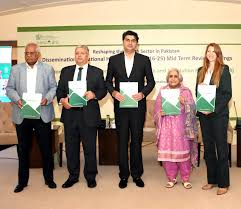Pakistan, UK partner on new health, population policy

Celina Ali
Islamabad: A new review calls for the merging of health and population strategies, stronger primary health care, cross sectoral collaboration on health, nutrition and population, and a strengthened response to emerging and re-emerging diseases.
The findings were presented at an event led by the Ministry of National Health Services, Regulations and Coordination. Coordinator to Prime Minister Pakistan on Health Dr Malik Mukhtar Ahmad and Federal Health Secretary Nadeem Mahbub joined the British High Commissioner Ms Jane Marriott to reflect on Pakistan’s progress under its National Health Vision for 2016-25 and kick-start a new Health and Population Policy for Pakistan 2025-34.
Key participants included federal government officials; provincial health departments including governments of Punjab, Sindh, Khyber Pakhtunkhwa (KP), Balochistan, Gilgit-Baltistan (GB) and Azad Jammu and Kashmir (AJ&K); and development partners.
Coordinator to the Prime Minister on Health, Dr Malik Mukhtar Ahmad, said: “Today we came together to assess exactly how well our National Health Vision to date has progressed, identify challenges and outline future health priorities for Pakistan. It is clear that we need to develop a combined National Health and Population Policy to take us to 2034.”
He further said, “The upcoming Health and Population Policy will be a cornerstone in guiding our health and population strategies moving forward, addressing current gaps, and setting a clear direction for achieving Universal Health Coverage, strengthening Primary Health Care and making Resilient Health Systems for sustainable health and population improvements. As we move forward, it is imperative that we reinforce the principles of good governance and effective stewardship in the health and population sector.
Dr Malik Mukhtar Ahmad stressed on the need for a Health Systems Approach to modernise the system for the future. He emphasised on the need to increase the production of good quality health workforce especially nurses, improve efficiency of hospitals, use of digital technologies, ensure availability of essential medicines and building capacities to tackle health emergencies and epidemics effectively and equitably, while considering fiscal space.
British High Commissioner, Jane Marriott said: “Today’s review shows that Pakistan has the capability to deliver healthcare for all. But important work is still needed, and all relevant sectors and provincial health departments should continue to work together to tackle the challenges Pakistan’s health system faces from climate change, poor nutrition, and rapid population growth.”
The review, supported by the British High Commission, of Pakistan’s progress under the National Health Vision for 2016-25 particularly highlights the need to merge health and population strategies. Through doing so, the effectiveness of the government’s family planning initiatives can be enhanced, and community awareness raised about the impacts of rapid population growth. The review also advocates for stronger primary care, disease prevention, cross-sector collaboration, and strengthening the response to emerging and reemerging diseases across the country.





